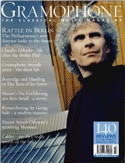Texte paru dans: / Appeared in:
*

GRAMOPHONE (10/2002)
Pour s'abonner /
Subscription information
AV9822

Code barres / Barcode: 7619986098227
Consultez toutes les évaluations recensées pour ce cd
~~~~ Reach all the evaluations located for this CD
Reviewer: Lindsay
Kemp
Although 21
operas by Vivaldi survive (he claimed to have written over 90), complete
recordings of them are rare, despite the fact that appreciation of his
talents as a composer of vocal music has increased considerably in recent
years. Any chance to investigate his operatic output should therefore be
welcomed, especially when it derives, as this one does, from a staged
production with all the gains in dramatic input and insight that brings. And
while little evidence has yet emerged to suggest that Vivaldi was a major
opera composer, it is inevitable that in so much music by such a fertile and
original imagination an occasional gem will turn up.
Such is the case with Farnace, the opera which Vivaldi composed for
the Venetian Carnival season of 1727. The story gives us the King of Pontus,
Farnace, defeated in battle by Roman forces under Pompeo, yet in rather
greater danger from his mother-in-law Berenice, whose anger at the murder of
her husband by Farnace 's father has never subsided. So blind is Berenice's
hatred that she is out to kill not only Farnace, but also his wife (her
daughter) and son. A further twist is added by the fact that Farnace orders
Tamiri to kill herself and the son rather than allow themselves to fall into
Roman hands, and cruelly denounces her when she fails to carry out the task.
One can hardly say that he comes out of this well, and indeed the opera's
most interesting characters are instead Tamiri, nobly bearing rejection by
mother and husband alike for sheer love of her son (she was originally sung
by Vivaldi's lady friend Anna Giraud), and Berenice, deranged by dreams of
revenge. Yet Farnace it is who has the opera's longest and most memorable
aria, a horror-struck realisation that his son's (presumed) death has been
his own doing, its imagery of blood running cold in the veins reinforced by
glacial string-writing and, unmistakably, the opening bars from 'Winter'
from The Four Seasons. (Cecilia Bartoli was obviously struck by this
number too, since she included it in her high-profile Vivaldi opera recital
for Decca – 12/99. Her performance, unsurprisingly, is dedicatedly
over-the-top.) In general, however, Farnace cannot be counted a huge
dramatic success; while it makes the customary operatic moves, its
characters develop Iittle (what Handel might have done with Tamiri and
Berenice!) and the music, while attractive and involving as always, misses
too many opportunities, sometimes even seeming strangely at odds with the
dramatic situation.
Yet there are worse things to do than spend three hours in Vivaldi's lively company, and certainly the performances here have much to recommend them. Jordi Savall directs with a sure hand, drawing exciting and committed playing from Le Concert des Nations and showing fine control of pace and momentum. The recitatives, so often rattled through in the studio, are much more convincing and natural for being part of a real production, and so too are the arias, with all the singers putting in strong and stylish performances. Top marks for acting go to the gloriously dignified contralto of Sara Mingardo as Tamiri, with Adriana Fernandez's ranting Berenice not far behind, but Furio Zanasi lacks a little in vocal resolve for the stubborn Farnace , and Gloria Banditelli could have offered more artfulness as his resourceful sister Selinda . Sonia Prina and Cinzia Forte both do what needs to be done with their rather conventional trouser roles. The recording, surprisingly resonant for a theatre, is edited together from just two performances, so there are some rough joins. More disconcertingly, there are also a number of places where the singers are off-mike almost to the point of inaudibility - surely more trouble could have been taken over this. Vivaldi's opera is not alI that we get here, however, since a handful of numbers from a setting of Farnace composed for Madrid in 1739 by the Italian-born Francesco Corselli have been stirred into the mix. What these arias, marches and sinfonias - all in a style noticeably later than Vivaldi 's - add to the drama apart from extra minutage, I cannot suggest, unless it be an excuse for Spanish government funding. They are enjoyable enough, but they can also be programmed out.
Cliquez l'un ou l'autre
bouton pour découvrir bien d'autres critiques de CD
Click either button for many other reviews


